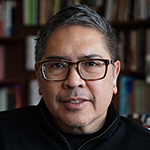
Often, if feels like President Duterte and his most fervent supporters like Mocha Uson are playing a political game that his critics are still trying to figure out.
It's as if the former are playing some kind of Virtual Reality video game while the latter are still stuck with a crude version of Donkey-Kong.
Duterte with his late night rambling speeches laced with jokes and obscenities, comes across as Dionysian, a kind of trickster figure running circles (with the aid of Mocha’s dancers) around his more Appolonian liberal critics.
His critics think they’re staking the high moral ground, drawing on historical precedent and laying out the legal basis for their opposition, while Duterte and company deploy tactics that are as extra-legal as they are amoral while flaunting the lessons of history (hence the embrace of Marcos and the constant flirtation with martial law).
Liberal opponents are concerned with recovering classical notions of truth (that is, truth as the unveiling of and correspondence with reality; facts as objective and settled representations of truth). Mocha and her troops, however, treat truth and lies as mutually constitutive rather than opposed, turning both into instruments with which to pursue an endless war. Her detractors are outraged at fake news and trolls. But Duterte’s supporters embrace these as tools to further their cause.
While the mainstream media seeks to set the record straight on the President’s words and deeds, the DDS media are intent on protecting the President from his detractors by any means necessary, usually resorting to ad hominem attacks, gossip and innuendo.
Witness, for example, the game between Senator De Lima and Secretary of Justice Aguirre and Duterte’s allies in Congress. Whereas the latter sought to defend herself by getting at the facts of the case against her, the latter were far more intent on destroying her reputation in order to silence her criticism of the President. Guess who won that game, at least for now?

His more liberal critics call for tolerance, fairness and open debate, which his followers see as signs of "elitist" decadence and naiveté. The former continue to be invested in conventional notions of education and proper behavior, while the latter dismiss such ideas, setting up new techniques to educate their followers and cultivate new norms of conduct that claim to be more "democratic." Memes replace critical education and trolling substitutes for debate.
The ongoing phenomenon of extrajudicial killings of suspected drug dealers and users is perhaps the most important issue that separates critics from supporters.
The former regard the nightly executions as gross violations of human rights and clear evidence of the coming specter of a police state. The latter, on the other hand, see such killings as stern measures needed to assure peace.
For this reason, they are scornful of the discourse on human rights as figments of the imperialist imagination designed to repress national sovereignty. They insist, instead, on a notion of selective rather than universal rights.
Tactics vs principles
In this way, Duterte supporters are still in campaign mode. They are all about tactics.
His opponents, however, like to think that they are wedded to principles. Hence, while the latter endlessly worry about the ethical link between means and ends, the former have thoroughly instrumentalized ethics as a means to accomplish a singular end.
Whenever his critics go left, Duterte goes right, only to suddenly swerve left, forcing his opponents to the right. And when liberals try to stake the middle, they find that position to have been taken away, leaving them out of balance and out of sync.
See for example the political vertigo triggered by Duterte's geo-political moves, attacking the US while befriending China and Russia. Similarly, his release of political prisoners and peace talks with the communist party has its evil twin in the unleashing of the police on poor communities.
He is the self-proclaimed socialist who has a Cabinet full of neo-liberals, lauded by both the lefties at UP and by the tycoons from Makati. He is the drug abuser who is the scourge of drug addicts, the serial womanizer who claims to be for women’s rights.
Inconsistency vs authenticity
His critics deride Duterte's inconsistencies: the yawning gap between pronouncements and policies, the steady seizure of power and use of conspiracy theories to quash dissent. But his followers regard the same inconsistencies as proof of his authenticity.
They use his off-the-cuff remarks about women, about his own drug use, about killing others, etc. as ways of poking fun at what they regard as the sanctimonious posturing of the "elite." They spawn conspiracy theories, nurturing rumors of coup plots hatched among wealthy Filipino Americans conspiring with the Vice President, using these as tools for eviscerating the opposition while muting serious debate.
Both Duterte and Mocha are adept at making virtues out of vices, repurposing mendacity into candidness, criticism into conspiracy. They excel in converting sinful pasts into narratives of redemption, thereby outmaneuvering the Church and civil society alike.
Indeed, this regime has sought to erase the difference between the state and civil society, making one into the extension of the other.
Thus do critics of Duterte find themselves faced with, for want of a better term, a post-modern authoritarian populism that hits them on all sides: from above, from below, from the left, from the right, from the front, and from the back.
It is a style of rule that presents itself as insurgent and counter-insurgent at the same time, or better yet, that uses an insurgent art to push a counter-insurgent agenda (shades of Trump!).
Unable to fully discern the rules of the game, it is small wonder that critics of Duterte are consistently outflanked and disorganized, further emboldening the likes of Mocha and other supporters. But for how long? That remains to be seen. – Rappler.com
Vicente L. Rafael teaches history at the University of Washington.